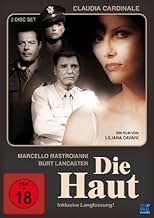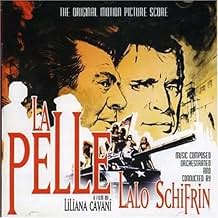NOTE IMDb
6,6/10
1,4 k
MA NOTE
Après la libération de Naples par les Alliés en 1943, la vie des habitants n'est pas beaucoup plus facile, surtout pour les femmes. Beaucoup sacrifient leur dignité et leur moral pour surviv... Tout lireAprès la libération de Naples par les Alliés en 1943, la vie des habitants n'est pas beaucoup plus facile, surtout pour les femmes. Beaucoup sacrifient leur dignité et leur moral pour survivre.Après la libération de Naples par les Alliés en 1943, la vie des habitants n'est pas beaucoup plus facile, surtout pour les femmes. Beaucoup sacrifient leur dignité et leur moral pour survivre.
- Réalisation
- Scénario
- Casting principal
- Récompenses
- 1 victoire et 2 nominations au total
Peppe Barra
- Sarto
- (as Giuseppe Barra)
Rosaria della Femmina
- Amante di Jimmy
- (as Maria Rosaria Della Femmina)
Avis à la une
I'd like to say that all these comments against this movie are inaccurate. La Pelle is a great movie. Hollywood would never make a movie like this. This movie has nothing to do with `Pearl Harbor'. La Pelle is a work of art, this is not another US war propaganda designed for a public brain wash. This movie is realistic, funny and sad at the same time. The story is very cleaver, intelligent. Perhaps, Americans don't like it because this movie depicts the US army involved in prostitution and in a certain disregard for the Italian people. Anyway, it's the best war movie I've ever watched in my life. There is no lies like in `Rambo', there is no hate like in `Platoon' (in which is good movie too). I recommend , I would say that it's excellent.
As a member of the US Air Force stationed in Naples during the movie I had the opportunity to appear in the film. I think I had 26 appearances in the film, all as a non-speaking extra. I got to know some of the actors, Ken Marshall was a really decent guy, Burt Lancaster (had a photo with him) always took 2 or 3 takes to get it right, Marcello Mastroiani was amazing, he spoke his lines like he was telling a story over dinner, just flawless! Claudia Cardinale was really nice the couple times we talked. It was really an adventure doing the film, there were many hours of just sitting around waiting for something to happen. Months later when the film was released they had two showings at the NATO base. It was a sell out both times and all you could here was everyone (along with me) saying things like: "Hey there I am, That was me, Look look, there I am again"! Someday I would like to see it again so I could hear what it was about. One last thing, the most memorable part of the film for me was when the American tanks (Korean war vintage) went through the town and the Italians all came out and cheered. That scene had to be done twice and then spliced together. Once the director yelled (in Italian) "cut", Bert stood up in his jeep, with his hands on his hips, looked at a now silent cast and proclaimed in his strong voice "In my 35 years of movie making, this is the most f***ed up fiasco I have ever been involved in"! Maybe that made it in the directors cut!
Maybe , two virtues : the cast and the realism about American presence in Italy after war. Shocking, a mix of Fellini and Catch 22, seductive for beautiful work of Marcello Mastrianni and for captivity of Burt Lancaster in a cage of cliches, it is adaptation of the novel of Curzio Malaparte, offering, in same measure, more than the word of book.
Maybe, today, more convincing about reactions, cliches and ways of survive in crisis time.
Exactly this cruel exploration of truth is its real virtue.
In short, a honest perspective about prejudices and tough lessons, about people behavior and their gestures.
Not story, only a chain of episotes. At final- a spoon of bitterness.
Maybe, today, more convincing about reactions, cliches and ways of survive in crisis time.
Exactly this cruel exploration of truth is its real virtue.
In short, a honest perspective about prejudices and tough lessons, about people behavior and their gestures.
Not story, only a chain of episotes. At final- a spoon of bitterness.
This movie is based on the true memoirs of the main character (Curzio Malaparte) during his time when he acted as diplomatic liaison between the Allied forces and the Italian in the newly occupied Italy. The book is a collection of short stories depicting the collapse of the Italian society under Allied occupation. There is no story line between those short stories. The movie puts them in chronological order, but the reigning chaos and lack of moral message (the message is exactly the lack of morality) can confuse the spectator.
This is a very original war movie, in that the main theme is the not the war front. The Allied are not viewed from their own perspective, which is one of true liberators. Instead, the movie shows the Italian people courting the Allies as liberators in order to escape from starvation. The Allies themselves are caught in a trap where they know the Italian hospitality isn't sincere, but are unable to understand why. They don't realize that before them, the Germans were courted as liberators too, and that in this context of food shortage and general poverty, the only way the Italians have to secure their survival is to play that game.
Malaparte (played by Marcello Mastroiani) acts then as a translator, helping the Americans as a guide would help a tourist, by explaining in each situation why people are acting in this seemingly dishonorable way.
La Pelle (The Skin) would make more sense if compared to Malaparte's twin book on the occupied Europe (Kaputt, or Broken to Pieces). In the latter, he portrays the Nazi way of oppressing through violence. In La Pelle, he shows how the Americans achieve a similar result through economic means, while refusing any responsibility. In Kaputt, Jewish women are made prostitutes by the German Army to escape death by the bullet; in La Pelle, Italian women become prostitutes for the American Army to escape death by starvation.
This is a very original war movie, in that the main theme is the not the war front. The Allied are not viewed from their own perspective, which is one of true liberators. Instead, the movie shows the Italian people courting the Allies as liberators in order to escape from starvation. The Allies themselves are caught in a trap where they know the Italian hospitality isn't sincere, but are unable to understand why. They don't realize that before them, the Germans were courted as liberators too, and that in this context of food shortage and general poverty, the only way the Italians have to secure their survival is to play that game.
Malaparte (played by Marcello Mastroiani) acts then as a translator, helping the Americans as a guide would help a tourist, by explaining in each situation why people are acting in this seemingly dishonorable way.
La Pelle (The Skin) would make more sense if compared to Malaparte's twin book on the occupied Europe (Kaputt, or Broken to Pieces). In the latter, he portrays the Nazi way of oppressing through violence. In La Pelle, he shows how the Americans achieve a similar result through economic means, while refusing any responsibility. In Kaputt, Jewish women are made prostitutes by the German Army to escape death by the bullet; in La Pelle, Italian women become prostitutes for the American Army to escape death by starvation.
In 1943, in Naples, Germans have just left the city when the Americans arrive, commanded by Gen. Mark Clark (Burt Lancaster), having the Italian Captain Curzio Malaparte (Marcello Mastroianni) as the liaison. The population is starving, with women and children prostituting themselves for food. Principessa Consuelo Caracciolo (Claudia Cardinale) is a noble Italian friend of Malaparte, and seems to be very adapted to all situations. Private Jimmy Wren (Ken Marshall) is the support of Captain Malaparte, and falls in love with a local girl. Honorific Colonel Deborah Wyatt (Alexandra King), an arrogant pilot and wife of an American Senator, comes to Naples to be promoted and get votes for her husband and the American president. Malaparte is assigned to show her the situation of the city. This movie is very strange, bizarre and violent. But although paradoxical, it is also fascinating. It shows a defeated people, needing to sell sons and daughters to survive. The last scene, when a tank passes over a local and Jimmy comes to apologize to Malaparte is fantastic. It shows the relation between winners and losers in a war. The cast has Burt Lancaster, Marcello Mastroianni and Claudia Cardinale, among others good actors and actresses. I like very much the work of Liliana Caviani, but this film certainly is not indicated for all audiences. My vote is seven.
Title (Brazil): `A Pele' (`The Skin')
Title (Brazil): `A Pele' (`The Skin')
Le saviez-vous
- AnecdotesThe film's editor was Ruggero Mastroianni, Marcello Mastroianni's brother.
- GaffesAt approximately 19 mn into the movie and again at approximately 1h18 mn, Goldberg, the roommate of Jimmy Wren (Ken Marshall), is seen reading an issue of the comic book "Batman". However the cover is clearly shown and is in fact that of issue N°257, published in August 1974, ie 31 years after the events of the movie.
- ConnexionsFeatured in Naples '44 (2016)
- Bandes originalesLa Pelle
written by Roberto De Simone
sung by Maria Kelly
recorded on "La Gatta Cenerentola"
published by La voce del padrone; EMI Italiana
Meilleurs choix
Connectez-vous pour évaluer et suivre la liste de favoris afin de recevoir des recommandations personnalisées
- How long is The Skin?Alimenté par Alexa
Détails
- Date de sortie
- Pays d’origine
- Site officiel
- Langue
- Aussi connu sous le nom de
- The Skin
- Lieux de tournage
- Casa Malaparte, Isle of Capri, Naples, Campanie, Italie(Villa of the main character, Curzio Malaparte)
- Sociétés de production
- Voir plus de crédits d'entreprise sur IMDbPro
- Durée2 heures 11 minutes
- Mixage
Contribuer à cette page
Suggérer une modification ou ajouter du contenu manquant






























